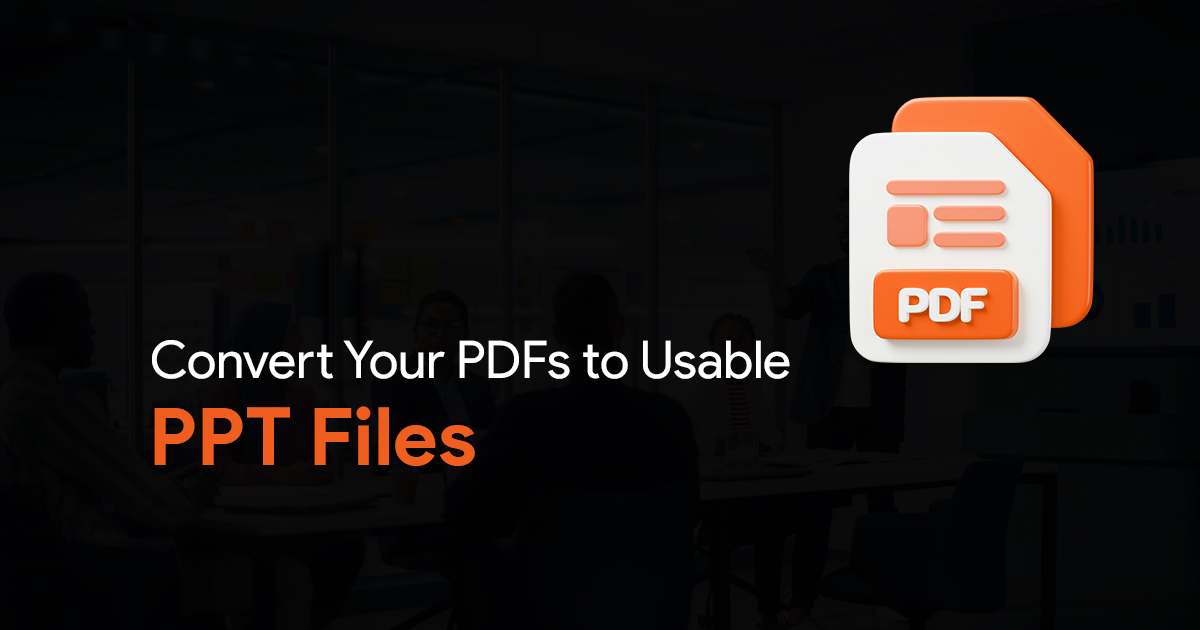- How to make a timeline in PowerPoint
- How to animate timeline in PowerPoint
- Making a Timeline in PowerPoint Interactive
- Tips for creating a timeline slide in PowerPoint presentation
- How to create a timeline in PowerPoint using a template? (Easiest +fastest method!)
- Why should you use timelines in PowerPoint?
- Let’s summarize how to create a timeline in PowerPoint
How to Create a Timeline in PowerPoint
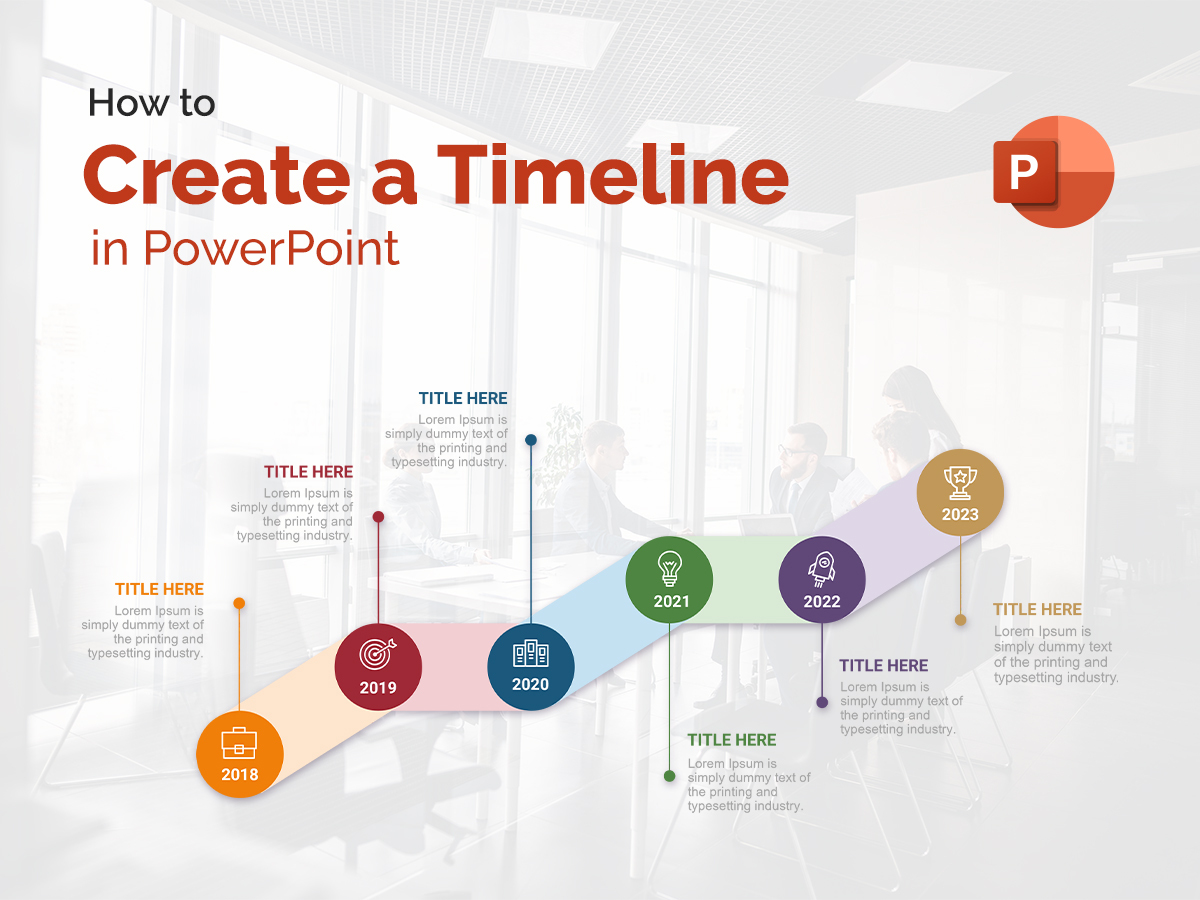
This article has been written with input from designers and presentation experts with over 7 years of experience. Welcome to the ultimate guide on how to create a timeline in PowerPoint.
In this article, we shall be looking at the easiest ways to create a timeline, animate it, and customize it as per your needs. The easiest way to get started is by using SmartArt graphic. However the problem with SmartArt tools is that a lot of professionals find it amateurish and cheap. SmartArt is also not easy to customize, sometimes it can really end up being a pain.
The alternative is to use a timeline template that can be easily downloaded and customized to fit your needs which can you can find in our free PowerPoint add-in:
Have a look at our project timeline template PowerPoint. Also, check out our blog on what is timeline.
How to make a timeline in PowerPoint
Let’s get started with creating a timeline in PowerPoint. If you prefer watching a video tutorial, check out this video from our YouTube channel:
How to insert a PowerPoint Timeline
To get started with a timeline, you’ll need to insert a SmartArt to your slide. You can do this by going to the Insert tab and then clicking on SmartArt.

Once the pop-up box appears, click on Process in the left side. You can try out different options that might suit what you’re trying to do. But for the sake of this article, find and select Basic Timeline.
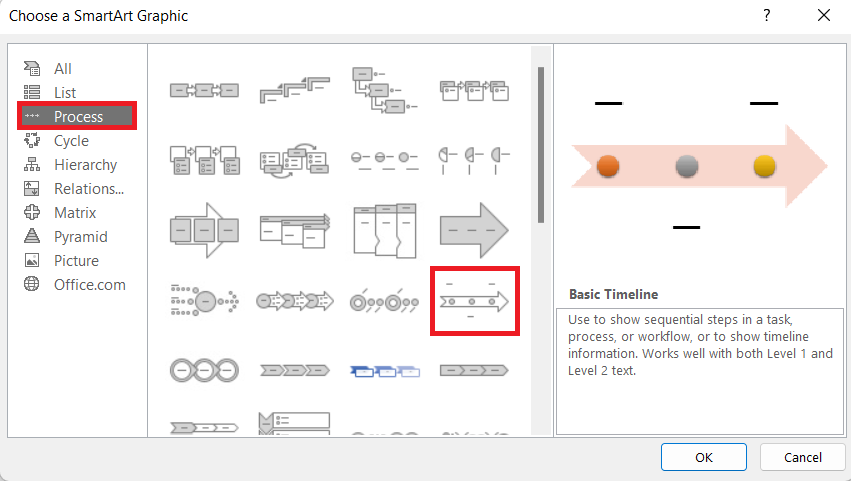
You’ll end up with something like this:
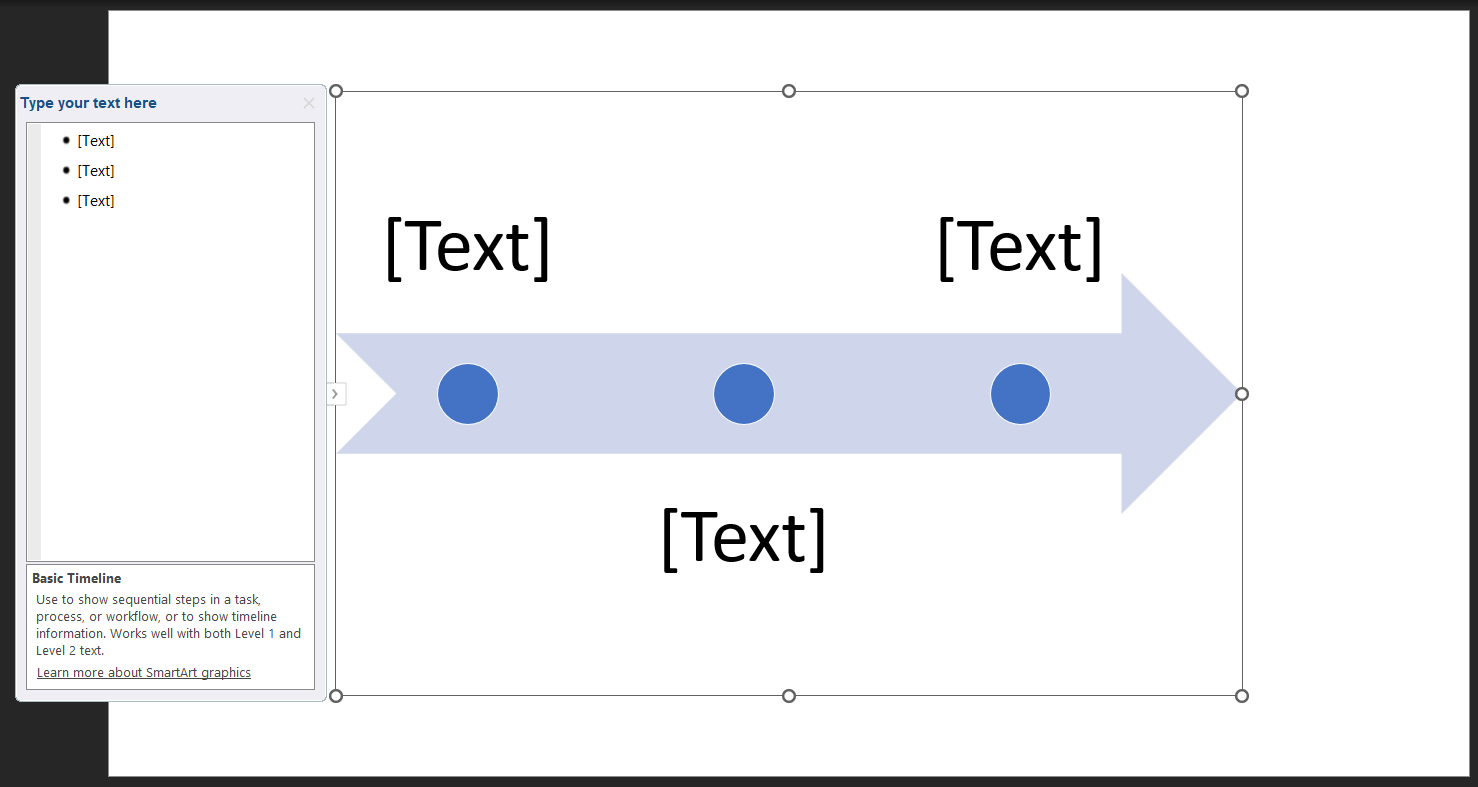
Click on the individual elements to edit or add new text. You’ll notice that while doing so, a pop-up window opens up on the left side titled “Type your text here”. This is the Text Pane. If this isn’t visible you can enable it by going to the SmartArt Design tab, and clicking on Text Pane.
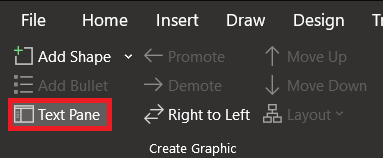
The Text Pane makes it easier to add and edit text and subheadings in your timeline, so it’s better to familiarise yourself with it.
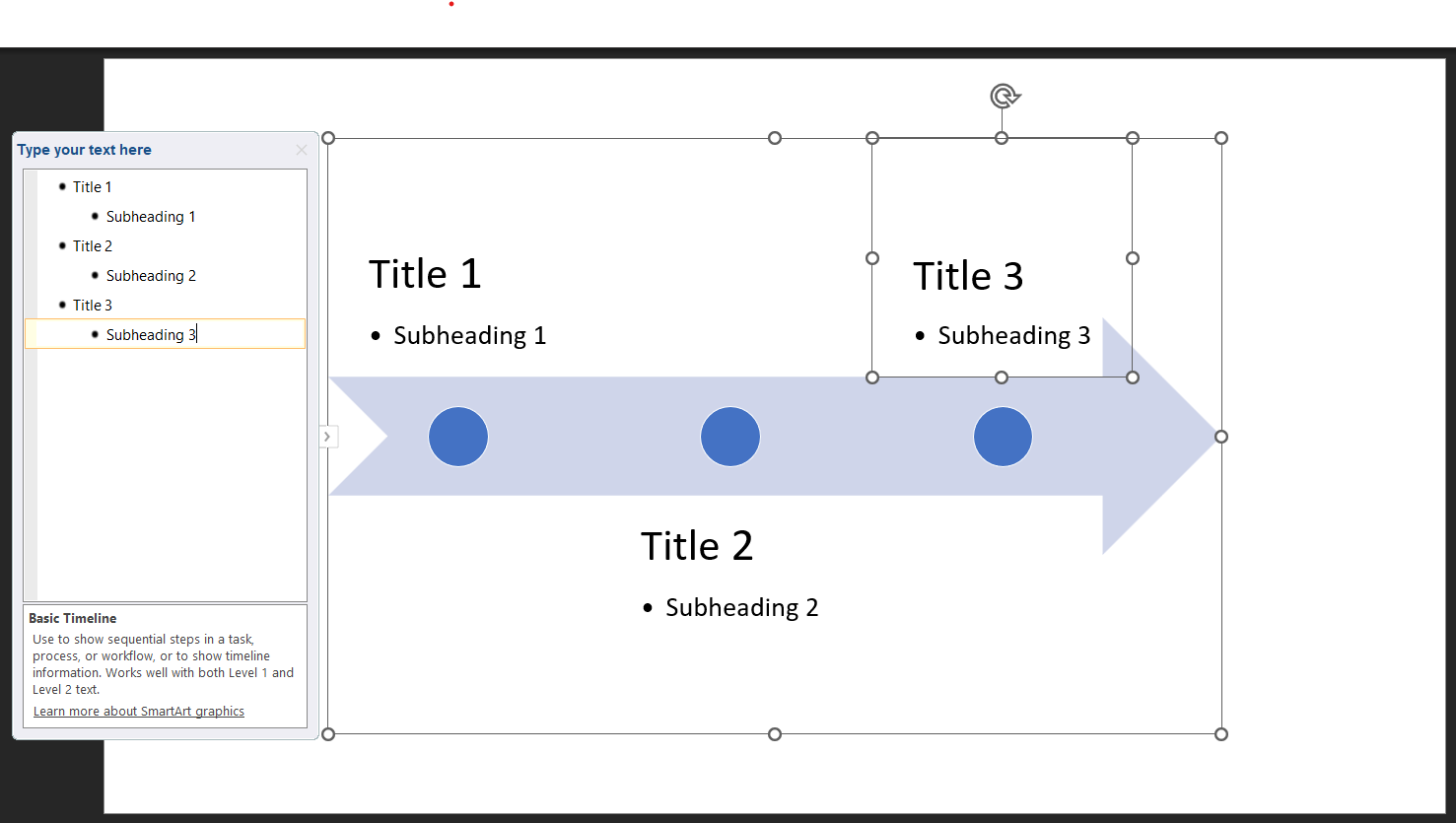
You can add the titles of each element using the Text Pane. If you need to add subheadings under any element, simply press Enter and click on Demote in the SmartArt Design tab to demote the text to a subheading.
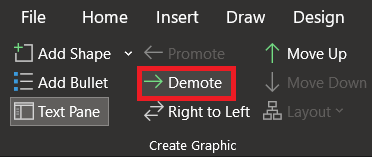
You may need to select the text and change the size of the font so that it fits better into the design.
You can add more elements in the Text Pane itself by adding more points, or you could just go to the SmartArt Design tab and click on Add Shape. Add the necessary content you need, and you should be done with a basic form of a timeline.
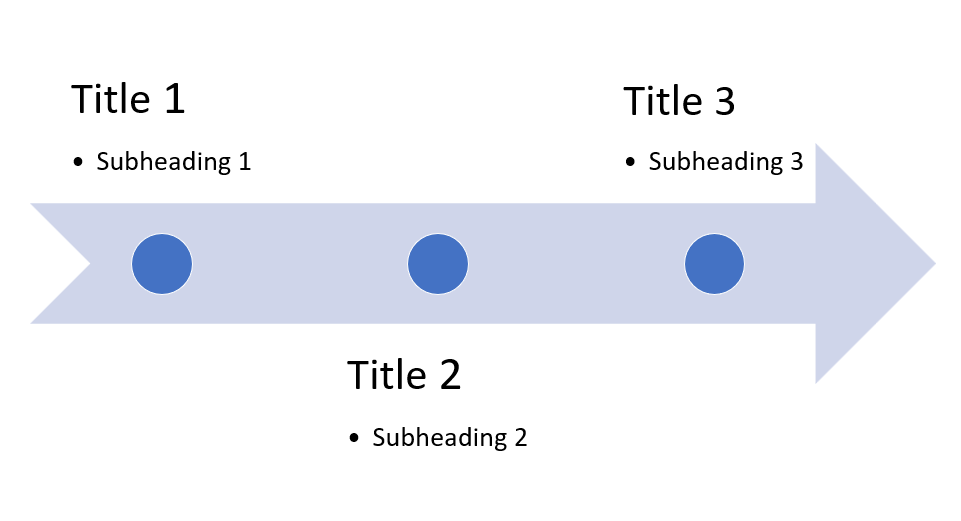
How to animate timeline in PowerPoint
You can easily animate your timeline so that every element appears sequentially. To do this, first select the entire timeline. In the SmartArt Design tab, click on Convert, and then click on Convert to Shapes.
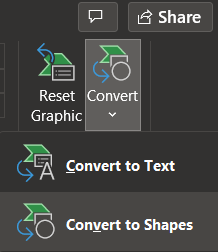
Once you do that, right click the timeline, and navigate to Group and click on Ungroup.
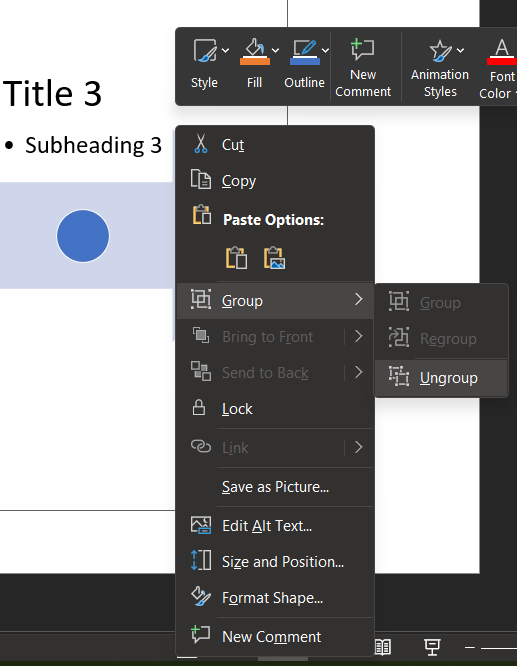
This will ungroup all elements of the timeline, enabling you to add animations to individual elements.
Click on the first element, and click on the Animations tab. Select a suitable animation effect. For our example, I’ve chosen Fade.
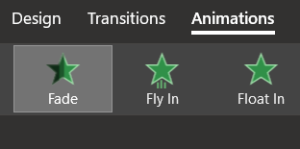
You can order the animations so that they appear one after the other smoothly. To do this, right after applying the animation, find the section titled Timing. Here, in the dropdown next to “Start:” click on After Previous. Do this for all the elements to get a smooth animation throughout, without having to click each time. Also now would be a great time to add some colors to your timeline.
Making a Timeline in PowerPoint Interactive
You can also make your timeline interactive. In PowerPoint, we have the feature to make each element of the timeline clickable. Let’s learn how to create clickable timelines that take the user to different slides.
To do this, right click on the element you want to make clickable. Click on Hyperlink, which should open a new dialog box called Insert Hyperlink.
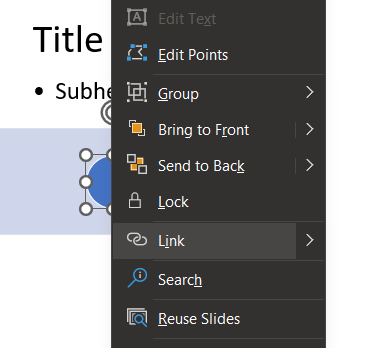
On the left side, select Place in This Document, and select the slide you want the user to navigate to.
Now, whenever you click on that element, it’ll take you to the slide you’ve selected. You could also add a button to navigate back to the timeline if needed. You can do this by inserting another shape, and following the above steps to make it clickable.
Tips for creating a timeline slide in PowerPoint presentation
Anyone can learn how to create a timeline in PowerPoint by following the steps above. How do you make sure that the timeline you’re making is good? Here are some tips you can keep in mind while creating a timeline in PowerPoint.
Plan ahead
It’s better to plan ahead, and write down all the information to be included in your timeline in a separate document first. This is to make sure that you do not miss out on any key information while you’re busy creating the timeline. You can focus on the design side of the timeline, while knowing that all the information within it is going to be top notch!
The text pane is your friend
Instead of using Demote and Promote buttons to create headings and bullet points, use the text pane to save a ton of time. This is the most effective way to add, edit and delete text from your timeline. After inserting a timeline to your slide, while editing the text, access the text pane by going to the SmartArt Design tab and clicking on Text Pane.
Use PowerPoint timeline templates
If you want stunning timelines without spending too much time on the design part, a template is the obvious choice. Let’s take a look at the easiest way to learn how to create a timeline in PowerPoint:
How to create a timeline in PowerPoint using a template? (Easiest +fastest method!)
This is the easiest way to create timeline in PowerPoint. If you have more complicated timeline designs in mind, but either lack the design skills or time to create them, you could always use a timeline template. These templates can be easily customized and edited to suit your needs. And the best part? It’s super easy to get started. Using a template barely takes any time, and you’ll end up impressing your audience with a beautifully designed timeline that gets the job done!
Check out some of these easy-to-use timeline templates for PowerPoint.
Why should you use timelines in PowerPoint?
There are many types of presentations that just works better with a timeline. In these cases, having a timeline can really elevate the effectiveness of your presentations. They become more impactful, memorable, and your message gets conveyed effectively. Here are a few use cases where having a timeline is a big advantage.
- Historical timeline: If you’re presenting historic events that happened in a chronological process, a timeline probably your best friend. You can use a timeline in your presentation to display the events that happened in a chronological order, along with additional details. Timelines are perfect for a graphical representation of any type of events!
- Milestone: You can use timelines in your slides to present milestones and deadlines for a project you are working on. A timeline gives your audience all the information they need, at a glance! Check out our website to get project timeline templates.
- To show your startup’s journey to a potential investor, or to present your company’s growth or a similar process. Investors need this kind of information, and a timeline can really help you convey maximum information in the easiest way.
Let’s summarize how to create a timeline in PowerPoint
So, there you have it, a complete guide to getting started with creating and building a timeline in PowerPoint. Once you get the hang of it, it’s an easy task that shouldn’t take you more than a couple of minutes. But for more complicated, visually striking, and impactful timelines that suit the colors of your other slides, you might need to look into a timeline template.
We hope you’ve found this article helpful and are able to make a timeline in PowerPoint easily. Check out more articles like this on our blog to drastically improve your presentations. Until next time, happy presenting!

